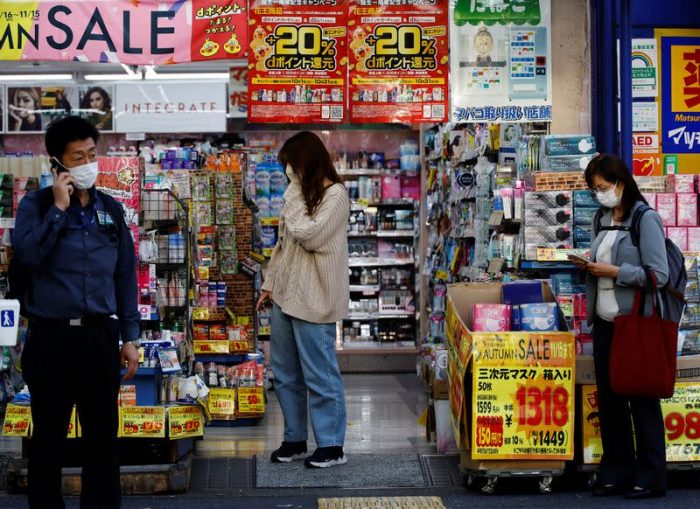Core consumer prices in Tokyo rose at their fastest pace in 40 years in November, indicating that inflationary pressure has broadened.
The price rises, driven mostly by food and fuel bills, but spreading to a broader range of goods, exceeded the central bank’s 2% target for a sixth straight month.
The increase cast doubt on the view of the Bank of Japan (BOJ) that recent cost-push inflation will prove transitory, some analysts said.
The Tokyo core consumer price index (CPI), which excludes fresh food but includes fuel, was 3.6% higher in November than a year earlier, government data showed on Friday.
The rise exceeded a median market forecast of 3.5% and the 3.4% increase seen in October. The last time Tokyo inflation was faster was April 1982, when the core CPI was 4.2% higher than a year before.
ALSO SEE:
South Korea’s Yoon Warns of Crackdown on Truckers Strike
Weak Yen Blamed
While the rise was driven mostly by electricity bills and food prices, companies were also charging more for durable goods as the weak yen pushed up the cost of imports, the data showed.
“Price hikes are broadening and suggests the weak yen could keep inflation elevated well into next year,” Mari Iwashita, chief market economist at Daiwa Securities, said.
“Core consumer inflation may stay around the BOJ’s 2% target for much of next year, which would make it hard for the bank to keep arguing that the price rises are temporary.”
The Tokyo core-core CPI index, which excludes fuel as well as fresh food, was 2.5% higher in November than a year earlier, picking up from the 2.2% annual gain seen in October.
BoJ an Outlier
The BOJ has kept interest rates ultra-low on the view that inflation will slow back below its target next year when the boost from fuel price gains dissipate. The central bank has therefore remained an outlier from a wave monetary tightening around the world aimed at combating soaring inflation.
Contrary to the experience of some western economies, where wages have surged with inflation, growth in wages and services prices remain muted in Japan.
Of the components making up the Tokyo CPI data, services prices in November were up just 0.7% on a year earlier, after a 0.8% annual increase seen in October. That compared with a 7.7% spike in durable goods prices for November, which followed October’s 7.0% annual gain.
Separate data released by the BOJ on Friday showed the corporate service price index, which measures prices that firms charge each other for services, had been 1.8% higher in October than a year earlier. That was slower than a 2.1% annual gain seen in September.
BOJ Governor Haruhiko Kuroda has repeatedly said that, for inflation to sustainably hit his 2% inflation target, wages must rise enough to offset the rise in goods prices.
Slow wage growth has been among factors delaying Japan’s recovery from the coronavirus pandemic. The world’s third-largest economy unexpectedly shrank an annualised 1.2% in the third quarter, partly because of soft consumption.
The Tokyo CPI data heightens the chance of further rises in nationwide core consumer prices, which in October were 3.6% higher than a year earlier, also marking a 40-year high. The nationwide data for November is scheduled for release on December 23.

Manufacturing Activity Down
Meanwhile, Japan’s manufacturing activity contracted at the fastest pace in two years in November as demand worsened due to strong inflationary pressures, a business survey showed on Thursday.
The contraction in factory activity also marked the first monthly decline in 22 months and raised a question mark over Japan’s economic outlook as the country relies heavily on trade with China and other nations for its growth.
The au Jibun Bank Flash Japan Manufacturing Purchasing Managers’ Index (PMI) slipped to a seasonally adjusted 49.4 in November from a final reading of 50.7 in the previous month.
That meant activity recorded the sharpest contraction since a 49.0 reading in November 2020 and fell below the 50-mark that separates contraction from expansion for the first time since January last year.
“Cooling demand conditions and acute inflationary pressures reportedly continued to hamper output and new orders,” said Laura Denman, an economist at S&P Global Market Intelligence, which compiles the survey.
“Manufacturing firms also seem to be increasingly wary about their future as indicated by a drop in business sentiment which put the index at its lowest level since May.”
Output contracted at the quickest pace in 26 months, falling for the fifth consecutive month, the survey results showed.
New export orders and overall new orders also posted marked declines.
Activity in the services sector stagnated even as new business inflows grew for a third straight month, the data showed.
The au Jibun Bank Flash Services PMI Index came in at a seasonally adjusted 50.0 in November, down from the previous month’s 53.2 final, the survey showed.
That could not prevent the composite index, which is calculated by using both manufacturing and services, from staying out of contraction.
The au Jibun Bank Flash Japan Composite PMI fell to 48.9 from a final 51.8 in the prior month, contracting at the fastest rate since February.
Data last week showed Japan’s economy unexpectedly shrank for the first time in a year in the third quarter, stoking further uncertainty about the outlook as global recession risks, a weak yen and higher import costs took a toll on household consumption and businesses.
- Reuters with additional editing by Jim Pollard
NOTE: Further details were added to this report on November 25, 2022.
ALSO SEE:
Japan’s Imports Surge 45% to Record High on Weakened Yen
























